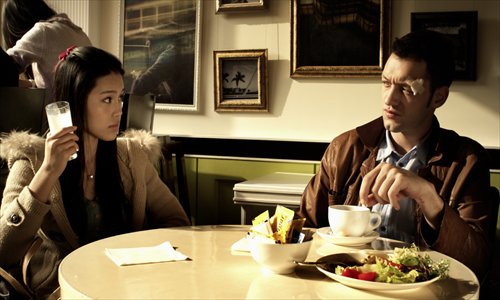Beware the Lao Wai

Seek the world. Seek the girl. Fall in love. Come back down to earth. The expat love story gets a film treatment in Lao Wai, a film about East-meets-West love.
French director Fabien Gaillard makes his full-length feature debut with Lao Wai, which runs until December 22 at the Broadway Cinematheque MOMA on Xiangheyuan Beilu, Dongcheng district.
"I wanted to show the way relationships really are for young people around the world right now," Gaillard said. "More and more foreigners are coming to China, for example, so I wanted to show how relationships begin and grow over time between people of totally alien cultures."
The potential of Lao Wai is sadly wasted on the very prejudices, misconceptions and stereotypes about Western-Chinese relationships that a film of its kind ought to challenge.
The tale in the film centers on the chance meeting of two individuals in Shanghai - a French I.T. engineer named Paul or "Dabao," played by Gauthier Roubichou, and female Chinese teacher Mei, played by Han Dan Tong.
Together Dabao and Mei experience the highs and lows of an intercultural relationship complicated by conflicting cultural instincts and values.
Though Fabien said the film was made "with Chinese audiences in mind," the characters often come across as one-dimensional caricatures.
Dabao is in many ways the quintessential male expat. He's happy-go-lucky, personable and unassuming. He's fluent in Chinese, but comes off as dim and shallow because his interest in China is never clearly explained or articulated.
Mei is beautiful and intelligent, restrained from outward affections and sulking over Dabao's nonchalance. When Dabao's ex-girlfriend Vicky enters the picture, Mei becomes a one-note character, solely focused on determining whether Vicky is a threat to her.
Vicky, a generalized portrayal of the high-functioning Western woman, speaks in a loud, brash, nasally voice and has a permanent look of frustrated anger that makes her easily unlikable.
A blandly portrayed relationship of two distant cultures in Lao Wai manages to take on a stronger form when pitted against adversary Vicky, but the relationship remains visibly stunted in its maturity throughout the film's 90-minute duration.
For instance, when the story jumps abruptly to "Six Months Later," the characters' cultural points of contention transpire weakly as they might on a first date rather than in a long-term relationship. For example, Dabao's taste for socializing with alcohol provokes Mei's disapproval, and Dabao confesses to Mei his dislike for spicy food.
When a misunderstanding involving a return to Dabao's life by Vicky causes Mei to move back with her parents in Wuhan, Hubei Province,Dabao travels by train to win her back, but ends up wandering aimlessly around the streets of port town Hankou.
Mei's life at home with her mother and father is the most sensitively told part of the story, though Galliard's intended audience are ironically the least likely to walk away having learned anything new about family pressures in China.
The film panders to clichés on all fronts. The Western male drinks excessively, and stumbles back and forth between relationships without concern for others. Conservatively high expectations of men mark the Chinese woman in Mei, while the Western single woman is restlessly manipulative.
Fabian Galliard told Metro Beijing his film is not autobiographical, though one of the film's more reflective scenes in which Dabao receives help paying for his hotel room by two young drifters in Wuhan was taken from his own experience of being lost in China.
While scenes in the film such as this offer a cultural insight to audiences left wanting more from the essential theme of Lao Wai, Chinese viewers are as likely to scoff at the naive portrayal of Dabao's pure-hearted friends as Western audiences are about nearly everything else.